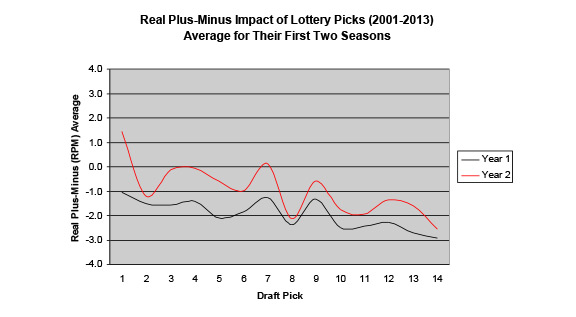Mike G wrote:The best rookies often go to the worst teams. If one is an average player going many minutes, that is a huge improvement.
The confusion of [average = contributes nothing], or [below avg = worse than nothing] is still alarmingly widespread. Even if you know what you mean, in or out of context, the average reader gets a completely wrong impression from such loose comments.
It's not just "theoretically possible" for another avg player to make a team better, it's about 90% likely.
Yes, I think the original article made a poor choice of words when it said this:
According to RPM, no rookie this millennium -- not even LeBron -- has had a major positive impact on his team.
According to their graph, the average #1 pick has had a rookie RPM of about -1.0. A negative player? No, as MikeG says, they were almost certainly making a major positive contribution to their team, relative to whatever stiff they were replacing.
The article committed a common mistake by mistaking a -1.0 rating for a "negative" contribution. It's only negative if we compare it to the average player. Which is far from the only, or even the most useful, comparison to make. Replacement level is usually a better comparison point, albeit somewhat hard to agree upon (although the dialog on Tom Tango's website seemed to have reached a consensus).
In LeBron James' rookie season, the Cavs won 35 games. If we do calculations the way the article did, the team was -6 compared to the average team's level of 41 wins: a negative outcome! I guess LeBron didn't help them!
The Cavs had won 17 games the year before. No "major positive impact" indeed.
SteveI and J.E. do good work and I'm glad they have that column on ESPN. The -1.0 RPM result is interesting and surprising. But they flubbed on the interpretation and wording of their conclusion.
